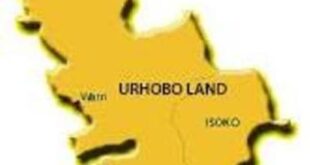By Tunde Uchegbuo
Crude oil was discovered in Obelle in 1963. The community has three functional oil wells out of six and a flow station that contributes to the global visibility of Rivers State as oil producing area. It is also a rich agrarian community.
Obelle is plagued by poverty and underdevelopment despite oiling Nigeria’s economy for 59 years. But more worrisome is the intermittent defilement of its sacredness by its own children, who ought to protect it from external aggressors. At the moment, the village can best be described as deserted, except for a few returnees and the herders that roam the area.
But beyond this situation at the moment, is a palpable fear of impending famine when the people finally return to their homes. This is due to the sacking of the community by armed groups at the peak of the farming season months ago.
From 2009 to date, Obelle has witnessed a series of cult-related violence that has negatively impacted on the social and economic development of the area. But what still baffles one is that the calamities do not just occur out of the blues, they simmer for a long while before snowballing into a crisis, with the attendant terror, suffering, and desolation.
The recent desecration of the sanctity of human life in the community is attributable to the up-shoot of weak institutional frameworks and an undiscerning leadership, which like the mariners in the Greek mythology, was hoodwinked by the gratifications of illegal oil bunkering and ended up surrendering the community to the whims and caprices of warlords.
Consequently, the leadership lost grip of control of the area, anarchy ruled and mayhem was unleashed. Since then, the land has been deserted till today.
Granted that it is the responsibility of the government to secure the lives and property of its citizens, as well as provide the necessary infrastructure to make life worth living, it is also obvious that this is not always the case, especially in Nigeria.
This explains why communities resort to self-help to provide basic infrastructure in areas where the government has failed. As a result, designing a functional security framework due to the surge in the wave of insecurity in the last two decades added a new impetus to communal projects.
So, while the people expect the government to take the lead in securing them, they also make personal and collective contributions to support efforts that are aimed at guaranteeing the security of their lives and property.
This is where I am disturbed by the seemingly indifferent attitude of the youths in Obelle, who appear to be unworried about the crisis bedeviling the land. For want of a better expression, the youths that have the vibrancy, network, and intellectual capabilities to champion moves towards the security of lives and property have opted to stay away.
While not unmindful of the challenges, the apparent unconcern by the youths is saddening and discouraging. Waiting for the government alone to initiate and drive a mediation process that will restore peace to one’s community is, to say the least, self-deceit.
So far, investigations have revealed that many Obelle people can no longer feed their families, while their dignities are being sacrificed on the altar of starvation. For this reason, I commend the efforts of the Emohua council chairman, Dr. Chidi Lloyd, and some indigenes, at initiating plans that will offer families that can no longer afford the extravagances of living outside the community the opportunity to return to their homes.
At the last count, more than five persons have died of preventable circumstances at the places they are taking refuge, while the corpses of deceased family members who died before the crisis are still in the mortuaries because they cannot take them home for burial, thereby adding to the financial burden.
Interestingly, some of the communities that have become ‘safe havens’ for the fleeing Obelle people had at one point or another, and not too long ago, been hit by similar circumstances. Yet, they did not leave their communities completely desolate.
For this reason, one might be tempted to say that the regular hospitality offered by the neighbouring communities whenever there is a crisis in Obelle is the albatross that inhibits Obelle people from exploring lasting solutions to the recurring issue confronting their land.
Obelle is our dear motherland, and it is our moral and civic responsibility to restore her dignity by ending the frequent bloodbaths and bringing serenity back to the land.
 PH Mundial – Port Harcourt Online Newspaper News Across The Region
PH Mundial – Port Harcourt Online Newspaper News Across The Region





